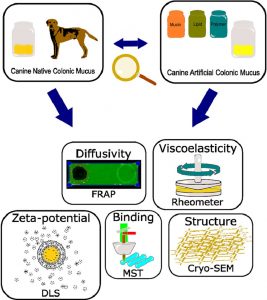Development of a canine artificial colonic mucus model for drug diffusion studies
V. Barmpatsalou, M. Tjakra, L. Li, I.R. Dubbelboer, E. Karlsson, B. Pedersen Lomstein, C.A.S. Bergström
Abstract
Colonic mucus is a key factor in the colonic environment because it may affect drug absorption. Due to the similarity of human and canine gastrointestinal physiology, dogs are an established preclinical species for the assessment of controlled release formulations. Here we report the development of an artificial colonic mucus model to mimic the native canine one. In vitro models of the canine colonic environment can provide insights for early stages of drug development and contribute to the implementation of the 3Rs (refinement, reduction, and replacement) of animal usage in the drug development process. Our artificial colonic mucus could predict diffusion trends observed in native mucus and was successfully implemented in microscopic and macroscopic assays to study macromolecular permeation through the mucus. The traditional Transwell set up was optimized with the addition of a nylon filter to ensure homogenous representation of the mucus barrier in vitro. In conclusion, the canine artificial colonic mucus can be used to study drug permeation across the mucus and its flexibility allows its use in various set ups depending on the nature of the compound under investigation and equipment availability.
Read full article here.



